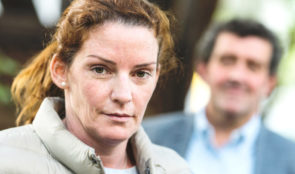I once heard Hillary Clinton speak in person, when I was a graduate student in Athens, Ohio, in the 1990’s. She spoke outdoors, and her voice, carried by loudspeakers, echoed against the university’s buildings. To my ear, she sounded great. She’s a good speaker, a solid speaker. People disagree with her positions and policies, of course, but she knows what she’s talking about. That day, she was rousing. I remember thinking that she was a much better speaker than I’d expected, better than when I’d seen her before on television.
More recently, when Clinton took the podium to accept her party’s nomination at the Democratic National Convention, she gave an important, historic and well-executed speech. Since then she’s spoken at countless rallies and three debates, maintaining her poise and composure even while being attacked by her opponent face to face. I cringed when I heard the Republican nominee threaten to jail Clinton when he becomes president. I cringed when I heard him accuse her of using performance-enhancing drugs. And I cringed again last night when I heard him call her “such a nasty woman” as she spoke about her tax plan. As ludicrous as some of his other off-the-cuff remarks have been, this Republican nominee has repeatedly shown a lack of respect for Clinton and her voice, as well as a lack of understanding or appreciation of any woman’s voice, including my own.
******
Before Hillary, no other woman had ever stood at that podium to accept the Democratic nomination… Click To TweetShirley Chisolm was a presidential candidate in 1972, when I was switching from an elementary school on the South Side of Chicago to one in our new (whiter) home of Springfield — the first African-American to run for president and the first woman to run for the Democratic Party’s presidential nomination. Another woman, Geraldine Ferraro, later became the Democratic vice presidential nominee in 1984, when I was in college giving up plans to become a surgeon, wondering whether I might become a writer. But, back then, Ferraro was a political gamble. She knew it, and so did everyone else. More than thirty years and three debates later, a woman on the ticket is no longer just a novelty. Hillary Clinton is being taken quite seriously as the Democratic presidential candidate and as a formidable opponent — and, very likely, the next president of the United States.
Back in July, Clinton began her convention speech by thanking her daughter, Chelsea, who introduced her. I would have welcomed the opportunity to introduce my mother in such a context. I can barely imagine speaking with the world watching me but I would have done it for my mother, and I would have been able to do it because I’ve learned to rise to the occasion even though I am not naturally performative. Clinton went on to acknowledge her relationship with her husband, forty-five years in and still going strong, and I thought of my mother then, too. My father died young, and my parents had only half as much time together.
Clinton acknowledged, “through all these years of public service, the ‘service’ part has always come easier to me than the ‘public’ part.
Until my father became ill, my mother, Mary Lee Leahy, preferred the service part too: walking precincts, researching precedents, and working things out through conversation and decisions. In 1981, when my father spent three months in the hospital, my mother bore their legal firm’s responsibility to appear in court, and she came to revel in that pressure and thrill in stepping up to each test of her abilities. In 1990, my mother argued a case in front of the Supreme Court, a case my father had urged her to take with the question, “If you don’t, who will?” I wonder whether Clinton, too, might have been egged on, at times, by such a question. My mother won that case, and I was there to watch her. My mother knew what she was doing. And when my mother discovered that a judge had referred to her as a witch, she proudly donned a witch’s hat for Halloween. Like Clinton, she was not surprised by attacks on her character or her gender but tried to draw strength from them. Like Clinton, my mother worked hard to master the role of orator that was a critical part of the public service she felt called to do.
Several of the pundits found Clinton’s voice that night at the convention shrill, annoying, grating, screeching. I didn’t hear her that way. Some tweeted that she should relax; others said she should do less lecturing and more smiling. I didn’t hear lecturing. I should know, I’m a professor. I didn’t need smiling either; I was listening to the radio. During NPR’s coverage of the speech, New York Times columnist David Brooks said, “I don’t know why she can’t project more humanity.” And NewsHour commentator Mark Shields offered faint praise, saying this was the best speech Clinton could have mustered. Were they really saying that, or had I misheard them? Had a misheard her?
I listened to Clinton’s convention speech on my local NPR station. Some of my women friends said they were brought to tears. My own heart caught in my throat… I heard my mother’s voice.
My mom had a work voice and a home voice. When I’d call her at the office, she’d talk with me in her work voice. Calm, measured, somewhat steely, sure of itself. When my sister and I were young, we teased her about her work voice. She didn’t use it at home, not even when she was angry with us. But when she was at her office, in court, or at a podium, it came naturally to her, after years of practice.
My mother cultivated that work voice — her public voice — early on, probably as a youngster while her mother was giving elocution lessons to neighborhood children. She definitely honed her speaking voice in high school drama class with Mrs. Crawford, who put a heavy dictionary on my mother’s belly to teach her to speak from her diaphragm. Certainly, the timbre of my mother’s public voice solidified during her debating years in college.
That was roughly the time when teenage Hillary Rodham had written to NASA to inquire about becoming an astronaut. She received a response that women were not considered for inclusion in the astronaut corps. (The first class at NASA to include women and people of color would be in 1978.) Hillary then turned her attention to other goals. In high school, she participated in a mock national election and helped write the student council’s new constitution — a few years before my own mother helped write the Illinois state constitution.
On March 24, 1962, my mother appeared in the Saturday Evening Post, dressed in a sheet that was supposed to look like a toga — one of the top ten debaters in the country and the top female debater that year.
Hillary Rodham’s first public speech was at Wellesley College. She was the first student ever to speak at a commencement ceremony there. She was introduced as “cheerful and good humored.” She sounds idealistic, smart, and, as I listen to the audio clips, I don’t imagine her smiling. She mentions the NASA space program but doesn’t say that it would not have her.
She talks of her mother, Dorothy, who told her, “I’ll always love you, but there are times when I certainly won’t like you.” My own mother made that same distinction clear to me too. Our mothers wanted to encourage us to handle those moments of not being liked, to resist saying merely what others want to hear — to resist silence, too. Our mothers taught us that we would feel fear but that we should not let that fear stop us from doing our work in the world.
In that early speech at Wellesley, Hillary talks of making the impossible possible, a strong intellectual argument that, in another voice, might come across as rhetorical or poetic. Instead, she speaks steadily. Vowel sounds echo, but her voice doesn’t vary much. She sounds just as I had imagined a younger version of Hillary would. She sounds as I might have sounded when I was in college — had I been able to bring myself to speak in front of an audience.
But I never spoke in front of an audience in college, as Hillary or my mother both had. Instead, I remember, late in each of my first two academic terms, a professor calling me into his office to say that I’d earned an A on every written assignment but, unless I spoke in class, I would receive a B. “Okay,” I replied each time. Okay, I’ll take the B.
I finally managed to speak in a women’s history class. My sister was also in the class, and when I spoke, my voice was unrecognizable to her. To my own ears, I sounded strained, broken, shrill. I had a voice but it was one I tried to avoid.
Later, in graduate school, in my first class as an instructor, I had twenty-two male students plus four female students who typically sat in the back row under the clock, by the door. I always gave excellent written feedback on papers and graded fairly and according to the guidelines. But when a faculty mentor observed my teaching, he told me that the female students had spent the entire class doing their nails. He couldn’t blame them, he said. He couldn’t hear me either. But he offered no advice on how to improve my delivery, to project my voice outward. I knew I couldn’t afford graduate school without a teaching assistantship, so I had to figure out how to change my voice.
I worked so hard to convey information and ideas in a voice that didn’t break, especially in those early years, that I’m sure I often forgot to smile. Several years later, in another graduate program, a faculty observer asked whether I was nervous. I wasn’t nervous but I did feel out of breath. A few weeks later, I realized walking the steep hill to class left me wheezing, and I was prescribed an inhaler.
Then, just a few years ago, I was asked to give the “Aims of Education” speech at the opening commencement for my university, to which new students and their parents are invited. I was one of just two women in academic regalia on that stage. I wrote a good talk, focused on content. And I gave a good a speech but I do remember thinking, I’m probably looking down too much to read and probably not smiling enough. I waited to hear my own heartbeat in my ears, to feel myself running out of breath, to hear my voice falter. But none of that happened. As I spoke and looked out at the full auditorium, I finally thought, So, this is what it’s supposed to feel like.
I’ve gotten better at public speaking but even now I am no great modulator of my voice, and the more I concentrate on what I’m saying and how I’m saying it, the less likely I am to smile.
I know what it means to be better at some things than at others, to have some talents that exceed other abilities. Confidence and competence are built by reaching beyond what one can easily accomplish enough times so that the task becomes easier, so that one’s abilities grow stronger. I do not care whether Hillary modulates her voice enough for everyone’s liking. When I listen, I hear confidence, competence, self-reliance.
Hillary’s mother died roughly a year before my own. My mother once told me that I had a responsibility to do the most for the world with the talents I had been given. I wonder whether Dorothy Rodham told her daughter something similar.
- Anna Leahy
Anna Leahy is the co-author of Generation Space: A Love Story, forthcoming from Stillhouse Press in 2017 and of Aperture, forthcoming from Shearsman in 2017. Her work has appeared in The Atlantic, The Rumpus, The Weeklings, and elsewhere. She currently teaches in the MFA and BFA programs at Chapman University.









Good for you, Anna Leahy. You were very lucky in your mother.
A real “coming of age” piece for you, Anna. Having known your Mom and heard he speeches and seen her in action, you are so much your “mother’s Daughter” and I know you will accomplish as much or even more than she did. Good observations on Hillary which are helping me soften my attitude. She will be a great President despite her failings. But then, don’t we all have some?
Anna, Maggie forwarded this wonderful piece. It truly made me cry. It was so touching.
Also went to the World Series with Maggie. We didn’t bring them any luck, but we had a great time.
Mary Rooney